Good quality
XinBo machine making CO. LTD is a professional manufacturer and exporter in roll forming machine,
VIEW MORE→Lip channels are an essential component in various manufacturing processes, particularly in the production of structural elements in construction, automotive, and aerospace industries. At its core, a lip channel is a type of metal channel characterized by a flanged edge, which reinforces its structural integrity. These channels are typically used to provide support and stability in frameworks, beams, and other constructions. Their design and functionality make them an integral part of many construction projects, where they facilitate connection points and load distribution. Understanding the specifications and variations in lip channels is crucial for engineers and designers involved in project planning and execution.
Lip channels are defined by their unique shape, which features a base and flanges that extend upwards at right angles. This design enhances the channel’s strength and flexibility, allowing it to be employed across a variety of applications. In construction, lip channels are commonly used to create frameworks for walls, support beams, and roofing systems. They also find applications in automotive manufacturing for body frames, as well as in the aerospace sector for lightweight structural components. The versatility of lip channels makes them popular in a wide range of industries, highlighting their importance in modern engineering.
Precision in the manufacturing of lip channels is paramount to ensure structural integrity and compatibility with other components. Even slight variations in dimensions can lead to significant impacts on performance and safety. Accurate measurements not only facilitate seamless integration into construction but also enhance the overall durability and reliability of the structures they support. Manufacturers utilize advanced technologies and quality control processes to maintain stringent standards in lip channel production. This emphasis on precision directly influences the effectiveness and efficiency of construction processes, ensuring that clients receive products that meet their specific needs.
The diversity in the sizes of lip channels available on the market allows engineers and manufacturers to select the most suitable option for their specific applications. Understanding the various sizes is crucial in building effective structures that can withstand the intended loads while meeting design specifications.
Lip channels are available in a wide range of standard sizes, typically defined by their height, depth, and thickness. Common dimensions may vary according to regional standards, but they generally include channels ranging from small to large, accommodating various requirements in construction and manufacturing. The choice of size will often depend on the application, the loads to be supported, and any spatial constraints present in the design. Standard sizing allows for ease of procurement and ensures that manufacturers can readily obtain the necessary materials for their projects, thereby streamlining the construction process.
Aside from standard sizes, many manufacturers offer customizable options to cater to specific application needs. Custom sizes can be produced to meet unique design criteria or to fit particular structural challenges. This flexibility not only allows designers to optimize their projects but also promotes innovative solutions in construction. Customizable lip channels can address issues such as weight reduction, improved load-bearing capabilities, or compliance with specific regulatory standards. Considering the tailored requirements of a project, engineers are encouraged to consult with manufacturers to explore the possibilities offered by custom lip channel dimensions.
The advent of the Lip Channel Machine has revolutionized the production of lip channels, enhancing both precision and efficiency. These specialized machines are designed to automate the manufacturing process, ensuring consistency in the quality of the finished product.

The Lip Channel Machine operates by using advanced techniques to shape and form metal into the desired channel configuration. Initially, raw materials are fed into the machine, where they undergo a series of processes, including cutting, bending, and welding as required. The machinery employs high-precision measurements and controls to produce lip channels that adhere to specified dimensions. Additionally, the machine can be programmed to create multiple channel sizes, streamlining production runs for manufacturers. This automation drastically reduces manual labor, allowing for faster output and a more cost-effective manufacturing process.
Utilizing a Lip Channel Machine offers numerous benefits concerning precision and efficiency in manufacturing. The automated technology employed allows for enhanced accuracy, significantly reducing human error and ensuring that each channel produced meets exacting standards. Furthermore, the efficiency of these machines means that large volumes of channels can be produced in a shorter timeframe, benefiting manufacturers who require quick turnaround times for their projects. Overall, the integration of a Lip Channel Machine into the production process maximizes productivity and minimizes waste, ensuring that businesses can maintain competitiveness in a demanding market.
The materials employed in the production of lip channels play a significant role in determining the strength, durability, and overall performance of the final product. Commonly used materials include stainless steel, aluminum, and structural steel, each exhibiting distinct properties suited to varying applications. Stainless steel, known for its corrosion resistance, is often favored in environments where exposure to moisture is inevitable, ensuring longevity without significant maintenance. Aluminum, on the other hand, is appreciated for its lightweight characteristics, making it ideal for applications where minimizing weight is paramount, such as in aerospace components. Structural steel, with its remarkable tensile strength, is typically utilized for heavy-load constructions, ensuring robust frameworks that can withstand significant forces.
Selecting the appropriate material for manufacturing lip channels is crucial and depends on various factors including environmental conditions, load requirements, and cost constraints. Engineers must assess the specific demands of their projects to choose a material that will maintain structural integrity while satisfying performance criteria. For example, in coastal or humid regions, opting for stainless steel may be necessary to avoid corrosion, while projects involving heavy machinery might necessitate structural steel for optimal support. Collaborating with material specialists can also assist in evaluating alternatives and innovative materials that may offer superior performance or cost-efficiency. Ultimately, the right material selection helps ensure that the lip channels fulfill their intended purpose effectively and sustainably.
Xinbo has established itself as a respected leader in the lip channel manufacturing industry, recognized for its commitment to innovation and quality. The company leverages advanced technologies in its production processes, resulting in superior lip channel products that meet diverse market needs. Xinbo’s state-of-the-art facilities are equipped with cutting-edge machinery, including the latest iterations of the Lip Channel Machine, enhancing production capabilities and efficiency. By focusing on research and development, Xinbo consistently aligns its output with evolving industry standards, making it a trusted partner for manufacturers and engineers globally.
Xinbo’s range of lip channel products is extensive, offering various sizes and materials to accommodate numerous applications. One of the standout features of Xinbo’s offerings is the precision engineering that goes into each product, ensuring high-quality outcomes that meet stringent specifications. Notably, their customizable solutions empower clients to pursue innovative designs that push the boundaries of conventional construction methodologies. Additionally, Xinbo provides exemplary customer support, assisting clients in selecting the appropriate lip channel sizes and materials that best suit their specific project requirements, thereby reinforcing long-term partnerships.

Quality assurance is a fundamental element in the production of lip channels, ensuring that every unit meets the established guidelines and specifications. Manufacturers, like Xinbo, implement rigorous verification processes throughout the production cycle, from the initial material selection to the final product assessment. These processes often involve using advanced measurement tools to verify dimensions and tolerances, as well as conducting material tests to ensure structural integrity under load. Regular auditing procedures and comprehensive documentation practices further enhance the traceability and accountability of the manufacturing process, providing additional assurance to clients about the quality of their lip channel products.
Manufacturers of lip channels are required to adhere to various industry standards and compliance measures that govern quality, safety, and performance specifications. These standards, which may include ISO certifications and ASTM material specifications, not only ensure product compliance but also promote best practices in manufacturing. Adhering to these recognized benchmarks provides verification to clients that the products are reliable and appropriate for their intended applications. Furthermore, compliance with industry standards helps manufacturers maintain credibility in a competitive market, reinforcing their reputation as quality-conscious producers dedicated to delivering products that meet or exceed customer expectations. Engaging in continuous improvement initiatives ensures that manufacturers not only meet current standards but also anticipate future trends and requirements in the evolving marketplace.
In summary, the sizes of lip channels, material selection, leading manufacturers like Xinbo, and stringent quality assurance processes all contribute to the reliability and effectiveness of lip channels in various applications. With the integration of advanced technologies such as the Lip Channel Machine, along with a strong focus on material properties and quality compliance, manufacturers can provide engineers and designers with innovative solutions that meet the complexities of modern construction and manufacturing challenges. Through careful consideration of these factors, professionals in the field can ensure the successful implementation of lip channels in their projects, enabling efficient construction and reliable structures.

XinBo machine making CO. LTD is a professional manufacturer and exporter in roll forming machine,
VIEW MORE→

